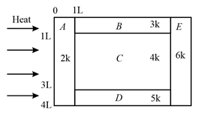B M Sharma Solutions for Chapter: Transmission of Heat, Exercise 4: Archives
B M Sharma Physics Solutions for Exercise - B M Sharma Solutions for Chapter: Transmission of Heat, Exercise 4: Archives
Attempt the free practice questions on Chapter 2: Transmission of Heat, Exercise 4: Archives with hints and solutions to strengthen your understanding. PHYSICS FOR JOINT ENTRANCE EXAMINATION WAVES AND THERMODYNAMICS solutions are prepared by Experienced Embibe Experts.
Questions from B M Sharma Solutions for Chapter: Transmission of Heat, Exercise 4: Archives with Hints & Solutions
A long metallic bar is carrying heat from one of its ends to the other end under steady-state. The variation of temperature along the length of the bar from its hot end is best described by which of the following figures?
A liquid in a beaker has temperature at the time and is the temperature of surroundings, then according to Newton's law of cooling, the correct graph between and is
If a piece of metal is heated to temperature and then allowed to cool in a room which is at temperature the graph between the temperature of the metal and time will be closest to:
Three very large plates of same area are kept parallel and close to each other. They are considered as ideal black surfaces and have very high thermal conductivity. The first and third plates are maintained at temperatures 2T and 3T respectively. The temperature of the middle (i.e. second) plate under steady state condition is
Two rectangular blocks, having identical dimensions, can be arranged either in the configuration or in the configuration as shown in the figure. One of the blocks has thermal conductivity and the other . The temperature difference between the ends along the -axis is the same in both configurations. It takes to transport a certain amount of heat from the hot end to the cold end in the configuration . The time to transport the same amount of heat in the configuration is:

Parallel rays of light of intensity, are incident on a spherical blackbody kept in surroundings of temperature . Take Stefan-Boltzmann's constant, and assume that the energy exchange with the surroundings is only through radiation. The final steady-state temperature of the blackbody is close to,
A composite block is made of slabs and of different thermal conductivities (given in terms of a constant ) and sizes (given in terms of length, ) as shown in the figure. All slabs are of same width.

Two spherical bodies (radius ) and (radius ) are at temperatures and , respectively. The maximum intensity in the emission spectrum of is at and in that of is at . Considering them to be black bodies, what will be the ratio of the rate of total energy radiated by to that of ?
